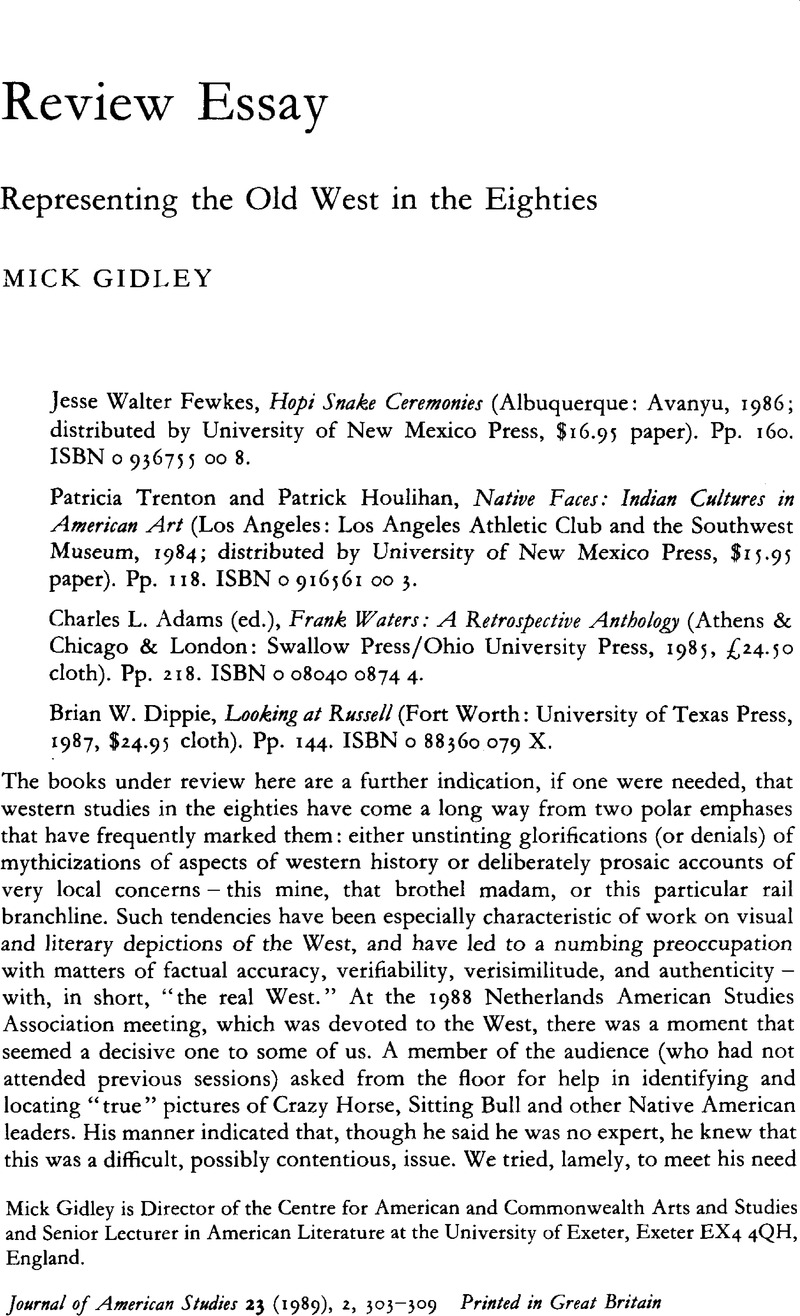Article contents
Representing the Old West in the Eighties
Published online by Cambridge University Press: 16 January 2009
Abstract

- Type
- Review Essays
- Information
- Copyright
- Copyright © Cambridge University Press 1989
References
1 Becker, Howard S., “Telling about Society,” in his Doing Things Together (Evanston, Ill.: Northwestern University Press, 1986), 126.Google Scholar
2 For excellent commentary on writings on the Hopi, see Laird, David W., Hopi Bibliography (Tucson: University of Arizona Press, 1977).Google Scholar Brief treatment of photography in particular may be found in Erin Younger, “A Century of Photography on the Hopi Reservation,” in Masayesva, Victor and Younger, Erin, Hopi Photographers, Hopi Images (Tucson: Sun Tracks and University of Arizona Press, 1983), 14–59Google Scholar, and Gidley, Mick, “R. B. Townshend's 1903 Snake Dance Photographs in Focus,” European Review of Native American Studies, 1, 2 (1987), 9–14.Google Scholar
3 Recent studies of Taos include Nelson, Mary Carroll, The Legendary Artists of Taos (New York: Watson-Guptill, 1980)Google Scholar and the more scholarly Broder, Patricia Janis, Taos: A Painter's Dream (Boston, Mass.: New York Graphic Society, 1980)Google Scholar and White, Robert R. (ed.), The Taos Society of Artists (Albuquerque, New Mexico: University of New Mexico Press, 1983).Google Scholar
4 See Pomeroy, Earl, In Search of the Golden West: The Tourist in Western America (New York: Knopf, 1957).Google Scholar There were numerous relevant brochures issued by such concerns as the railroads, including Dorsey's, George A. popular “anthropological” coverage, Indians of the Southwest (Chicago: Santa Fe Railway System, 1903)Google Scholar, with photographs by several leading figures. For a recent picture collection with commentary see McLuhan, T. C., Dream Tracks: The Railroad and the American Indian 1890–1990 (New York: Harry N. Abrams, 1985).Google Scholar
5 For DeMallie's searching use of documents to establish a fuller picture of the composition of the Sioux holy man's vision, see his edition, The Sixth Grandfather: Black Elk's Teachings Given to John G. Neihardt (Lincoln, Nebraska & London: University of Nebraska Press, 1984).Google Scholar For ideas on the two voices involved in the production of so much Indian memoir material, I am grateful to David Murray of Nottingham University for a seminar paper given at the Institute of US Studies, London, in the spring of 1986. See also Krupat, Arnold, For Those Who Came After: A Study of Native American Autobiography (Berkeley, California: University of California Press, 1985).Google Scholar
6 Waters's transpositions of whole passages of description and narrative, sometimes with subtle changes, from one work to another, create a curious sense of déjá vu in the reader and call into question the autonomy and status of each separate text.
7 Broder, in A Painter's Dream, cites it. A recent book which distills a good deal of previous work on artistic representations of the West, if relatively uncritically, is Goetzmann, William H. and Goetzmann, William N., The West of the Imagination (New York & London: Norton, 1986), especially, for present purposes, chapters 28 and 29.Google Scholar
8 For a biography of this extraordinary woman, see Hignett, Sean, Brett: From Bloomsbury to New Mexico (London: Hodder and Stoughton, 1985).Google Scholar
9 Jussim, Estelle, Frederic Remington, the Camera and the Old West (Fort Worth, Texas: Amon Carter Museum, 1983).Google Scholar Interesting comments on the structure of Remington's pictures and parallels with his fiction are to be found in Bold, Christine, Selling the Wild West: Popular Western Fiction, 1860 to 1960 (Bloomington & Indianapolis: University of Indiana Press, 1987), 52–64.Google Scholar
10 Goetzmann and Goetzmann, for example, perpetuate such a view in their chapter “Cowboy Genius,” The West of the Imagination, 258–83.Google Scholar
11 See Dippie, , The Vanishing American: White Attitudes and U.S. Indian Policy (Middletown, Conn.: Wesleyan University Press, 1982).Google Scholar Another useful treatment of related issues is Mitchell, Lee Clark, Witnesses to a Vanishing America: The Nineteenth Century Response (Princeton: Princeton University Press, 1981).Google Scholar
- 1
- Cited by


